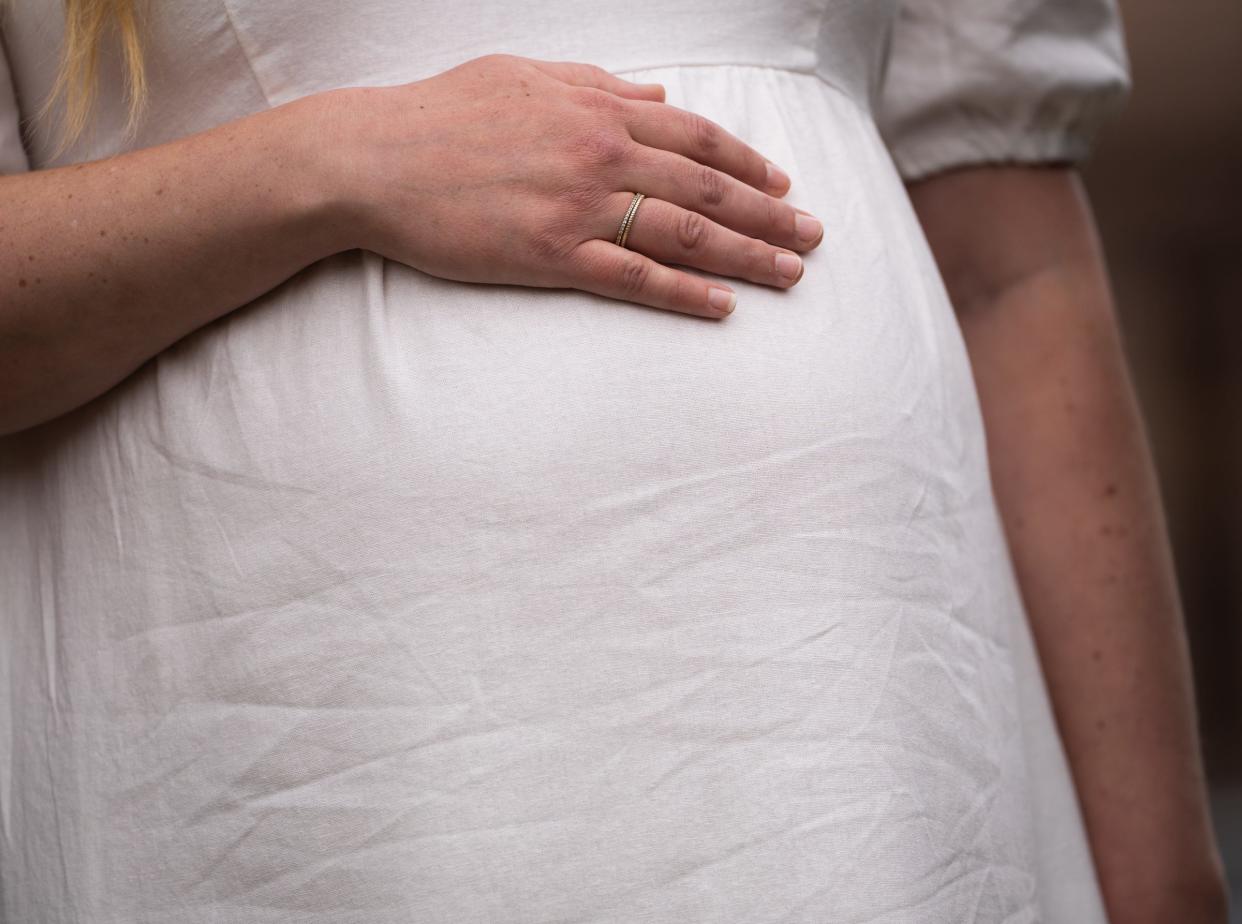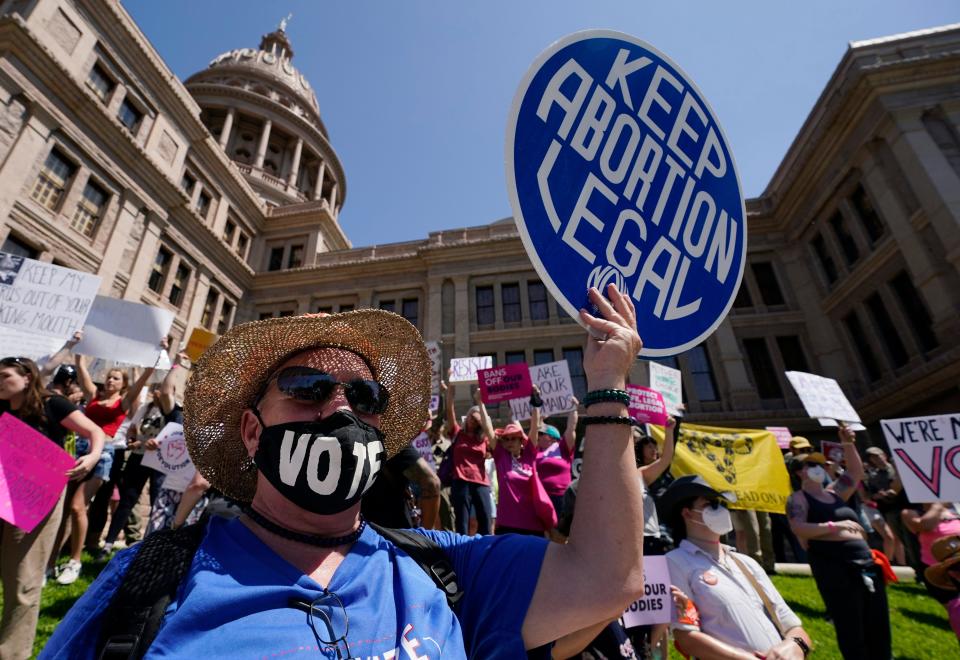Texans have had 26,000 rape-related pregnancies since Roe v. Wade was overturned, study finds

More than 26,000 Texans are estimated to have become pregnant as a result of a rape since the U.S. Supreme Court struck down Roe v. Wade in June 2022 — the highest number among the 14 states that enacted total abortion bans after the high court ended the federal right to terminate a pregnancy, according to a peer-reviewed study published in the Journal of the American Medical Association.
The study, published Wednesday, estimates that 5,586 of the rape-related pregnancies, or 9%, occurred in states with rape exceptions to their bans, and 58,979, or 91%, occurred in states with no exceptions. Texas, which allows abortions only when the life of the mother is at risk, had the most pregnancies resulting from rapes — 26,313, or 45% of the 14 states' combined total. Texas has the largest population of the 14 states studied.
Fewer than 10 abortions per month are reported in each of the states analyzed, the study says, suggesting that even in states with exceptions for rape, survivors are not accessing abortion services.
In Texas, an average of nine abortions per month occurred between July 2022 and June 2023, according to the Society for Family Planning. In 2021, the year when the state banned abortion after about six weeks of pregnancy, more than 50,000 pregnancies were terminated in Texas; in 2020, nearly 54,000 abortions occurred, according to data from the Texas Health and Human Services Department.
President Joe Biden and Vice President Kamala Harris have made abortion rights, and Texas' ban in particular, a focus of their reelection campaign, featuring plaintiffs of a major Texas abortion lawsuit over medical exceptions in campaign ads. The White House has also invited Kate Cox, a Dallas woman whose request to terminate a pregnancy with a fatal fetal diagnosis was rejected by the Texas Supreme Court in December, to attend Biden's State of the Union address in March.
“It is unconscionable that this is happening in America. The overturning of Roe v. Wade has already led to 21 dangerous abortion bans in effect in states across the country, many of which have no exceptions for rape or incest," White House spokesperson Kelly Scully told the American-Statesman. "This is the extreme agenda that Republican elected officials want to impose in every state in the country through a national abortion ban. President Biden and Vice President Harris will continue to fight for the right to choose and call on Congress to restore the protections of Roe v. Wade in federal law.”
More: Austin lawyers petition Texas Medical Board to clarify medical exceptions to abortion ban
To form the basis of the study, researchers used confidential survey data on sexual assault from the U.S. Centers for Disease Control and Prevention and crime data from the FBI and the Justice Department to estimate rape numbers. Researchers then applied state-level data on the percentage of completed rapes that resulted in pregnancies. They projected that 519,981 completed rapes and 64,565 resulting pregnancies occurred during the four to 18 months the abortion bans have been in effect in all 14 states.
More: Amid abortion ban, Texas teen birth rate in 2022 increased for first time in 15 years
Five of the states studied have exceptions for rape but require the assaults to be reported to law enforcement. Women are most likely to experience sexual assault at the hands of intimate partners or acquaintances; only about 1 in 5 rapes are committed by strangers, according to Justice Department statistics. White said that, under those circumstances, seeking abortion care is more complicated for many survivors.
"No woman anywhere should be forced to birth her rapists’ baby," state Sen. Roland Gutierrez, D-San Antonio, wrote in a statement on X, formerly Twitter, after the report was published. "No child anywhere should be forced to birth her rapists’ baby."
Determinants such as race and economic status often further complicate abortion care for many women and girls seeking to end a rape-related pregnancy in states with abortion bans, experts say.
“It's very difficult for people who may not even have control of their own financial resources to get to another state to get abortion care, or to get out from under the person who caused it, (and) to travel for hundreds of miles or overnight to get the kind of health care that they need,” Dr. Kari White, the report's co-author and director of the Austin-based Resound Research for Reproductive Health, told the Statesman.
White estimates that rape-related pregnancies in Texas will likely increase, with no sign from the Republican-controlled Legislature of budging on the state's ban.
“With the abortion ban still being in place in Texas, the large numbers that we're seeing now are likely to continue to grow,” she said.
How many rape-related pregnancies have there been in states with total abortion bans?
States with rape exceptions:
Idaho — 1,436
Indiana — 1,098
Mississippi — 1,409
West Virginia — 1,255
North Dakota — 388
States with no rape exception:
Alabama — 4,130
Arkansas — 4,655
Kentucky — 2,965
Louisiana — 4,287
Missouri — 5,825
Oklahoma — 4,529
South Dakota — 1,282
Tennessee — 4,993
Texas — 26,313

This article originally appeared on Austin American-Statesman: Texas has most rape-related pregnancies in states with abortion bans

